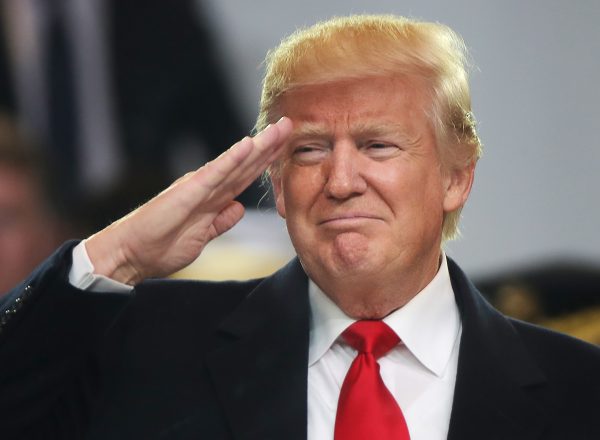‘For many decades, we’ve enriched foreign industry at the expense of American industry’, Trump declared in his inaugural speech, ‘[we’ve] subsidised the armies of other countries while allowing for the very sad depletion of our military; we’ve defended other nation’s borders while refusing to defend our own; and spent trillions of dollars overseas while America’s infrastructure has fallen into disrepair and decay’.
‘From this moment on, it’s going to be America First, America First’, Trump hailed. ‘Every decision on trade, on taxes, on immigration, on foreign affairs, will be made to benefit American workers and American families. We must protect our borders from the ravages of other countries making our products, stealing our companies, and destroying our jobs. Protection will lead to great prosperity and strength’.
That the United States under Trump would ‘reinforce old alliances and form new ones — and unite the civilized world against radical Islamic terrorism’ might provide a reassurance to allies in Asia and the Pacific, but one that is deeply qualified by the notion that paying for US deployments abroad is under scrutiny.
What is Donald Trump like and what will his presidency really be about?
No one can know for certain: the only predictability about Trump is his unpredictability. But the experts on Trump, those who have studied his life and career and written his biographies, are clear on three things.
‘They see the same person they’ve always seen — the consummate classroom troublemaker; a vain, insecure bully; and an anti-institutional schemer, as adept at ‘gaming the system’ as he is unashamed of that. As they look ahead … to his administration … they feel confident predicting that he will run the country much as he has run his company: for himself’.
Apart from his father, Donald Trump’s chief mentor in life was Roy Cohn, a Joe McCarthy henchman, ‘a guy who stood for cold-eye calculus about how bullying people works’.
The world out there, without its norms or conventions, for which Trump on his record has no respect, is a bigger bully pit than even he has had to deal thus far in his career. On all the evidence we have, there is zero chance that in the fights he picks with world leaders Trump will be capable of separating personal pique from his country’s interests — let alone the interests of the broader public.
Nothing about inauguration day has allayed the two main anxieties for Asia that have been fuelled by the harbingers of radical change under a Trump presidency.
The old certainties that brought prosperity and a significant measure of stability to world affairs for over three-quarters of a century after the Second World War are no longer clear.
The US anchor of the Western security system, on which order in Asia and the Pacific has relied, may be being weighed.
The institutional edifice on which economic certainty and political confidence in the US-led global order has been built — the postwar institutional framework that guaranteed economic openness and the prospect of economic and political security — is under threat as Trump appears bent on trade wars and calls for protectionism. This is not a narrowly economic problem: it affects the global security outlook and especially economic and political security in Asia and the Pacific.
The comfortable view in Tokyo, Canberra and even in Beijing that Trump in election mode was all political rhetoric, and that US global economic and security strategies would largely remain undisturbed, has given way to deeper disquiet. Reliance on the enduring operational verities of continuing strategic engagement with Washington, around the uncertainties that Trump brings to the game, is an increasingly doubtful refuge for the business-as-usual camp.
So how do we deal with the new Trump reality show in Asia?
Certainly not by sitting back and taking what the bully pit dishes up, argues Hitoshi Tanaka in this week’s lead essay. Trump’s ‘America First’ foreign policy rhetoric is moving the United States away from its traditional role as a global leader at a time when the domestic and international political environments are undergoing significant change, Tanaka points out. Japan, as the United States’ most important ally in Asia, has to get on the front foot in defining the kind of engagement it wants with America. Prime Minister Abe, Tanaka says, has been right to engage Trump early and, he might have added, to swing through Southeast Asia and Australia last week to seek common positions across the region.
‘Given that Trump appears keen on having Japan expand its share of the security burden’, says Tanaka, ‘the best option would be intensive US–Japan consultations that aim to forge a common approach to key challenges as an initial step toward a joint US–Japan strategy for the region’. The overarching objective would be to retain and enhance US engagement in Asia while bolstering Japan’s security roles and functions within the alliance framework, and its contributions to peace, without opening a regionally destabilising Pandora’s box’.
An important strategic priority among the four that Tanaka identifies is nurturing a stable and inclusive regional order. ‘On its current trajectory, the Asia Pacific regional order risks fracturing into a two-tiered structure comprised of the US-led liberal international order and an emerging Chinese sphere of influence’. The United States and Japan should prioritise engagement with China and find a new way to coordinate among regional institutions and advance cooperation among Asian powers. This requires rapid and immediate elevation of consultation among the Asian powers.
Sitting back and relying on old default settings is unlikely to work in the new bully pit.
In the new Trump era, Prime Minister Abe, on regional engagement, and Chinese President Xi Jinping, on the importance of economic globalisation at Davos, have both set good examples of getting on the front foot in Asia. One hopes that other Asian leaders, individually and collectively, will quickly follow suit.

